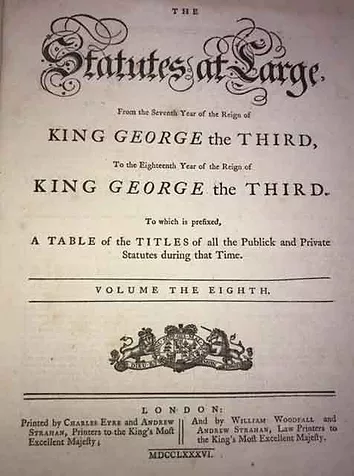Before passage of the act, Massachusetts enjoyed a significant degree of self-governance, allowing colonists to exercise local autonomy and manage provincial affairs with minimal interference. However, following the Tea Party, British officials viewed this autonomy as a breeding ground for resistance to British economic and political policies and potential rebellion. Thus, the act aimed to curtail these self-governing privileges and signal expected obedience to royal authority.
The act introduced several key political changes. First, it revoked the Massachusetts Charter of 1691 by declaring it “void and of no effect.”1 The charter was considered a sacred constitutional document in which the Crown formally declared that British subjects’ rights, privileges, and liberties applied equally to Massachusetts colonists.
The act restricted colonial town meetings by ordering that “the select men shall call no meeting...without the leave of the governor...in writing, expressing the special business of the said meeting.”2 Massachusetts residents viewed town meetings as vital to their right to self-governance. However, British authorities asserted that town meetings across the colony fomented rebellion and, thus, quickly moved to curtail its power.
It also shifted the selection of the Governor’s Council from the colonists to royal appointment. Allowing the king to appoint members ensured the council aligned with British interests rather than protecting Massachusetts’ best interests. The council served as an advisory body to the governor and was seen as a safeguard against excessive governmental intrusions.
The act empowered the Massachusetts military governor, General Thomas Gage, to appoint and remove government servants, including judges, the attorney general, justices of the peace, and other officials, without the consent of the Governor’s Council or the colonial legislature.
This centralization of power was intended to cripple colonial resistance by removing those officials who expressed sympathy for the colonists’ cause and replacing them with Loyalists who would be willing to support Crown policies and laws openly.
Finally, and most troubling, the act gave the royal governor unprecedented powers over the legislature, including the authority to dissolve the colonial legislature and limit British civil liberties within the courts. In June 1774, Thomas Gage exercised this authority by disbanding the legislature. He declared, “I have therefore thought it fit to dissolve the said General Court, and the same is hereby dissolved accordingly, and the Members thereof are discharged from any further Attendence.”3
The British government justified these measures as necessary to restore order and uphold imperial authority. However, colonists viewed the act as a direct assault on their rights. They argued, “This colony was then reduced to great difficulties, being denied the exercise of civil government according to our charter or the fundamental principles of the English constitution.” The suppression of self-governance and the imposition of external control galvanized colonial opposition, which led to the formation of the Massachusetts Provincial Congress, an illegal legislative body composed of colonists who pledged “to promote … the peace, welfare, and prosperity of the Province.”4
Notes:
1 American Battlefield Trust. “The Massachusetts Government Act; May 20, 1774,” accessed January 11, 2025, www.battlefields.org/learn/primary-sources/massachusetts-government-act-may-20-1774.
2 Ibid.
3 Northern Illinois University Digital Library, “The General Assembly Dissolved by Governor Gage,” accessed January 11, 2025, https://digital.lib.niu.edu/islandora/object/niu-amarch%3A102082. See also Michael McWeeney, “The Battle for Legitimacy and Sovereignty in Revolutionary Massachusetts: 1774-1775” (dissertation, The Ohio State University, 2010).
4 Massachusetts Provincial Congress, October 5, 1774; Journals of Each Provincial Congress of Massachusetts in 1774 and 1775: And of the Committee of Safety, with an Appendix, Containing the Proceedings of the County Conventions-narratives of the Events of the Nineteenth of April 1775-papers Relating to Ticonderoga and Crown Point, and Other Documents, Illustrative of the Early History of the American Revolution. Boston: Dutton and Wentworth, Printers to the state, 1838.


